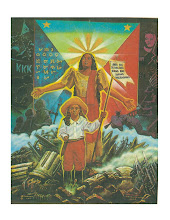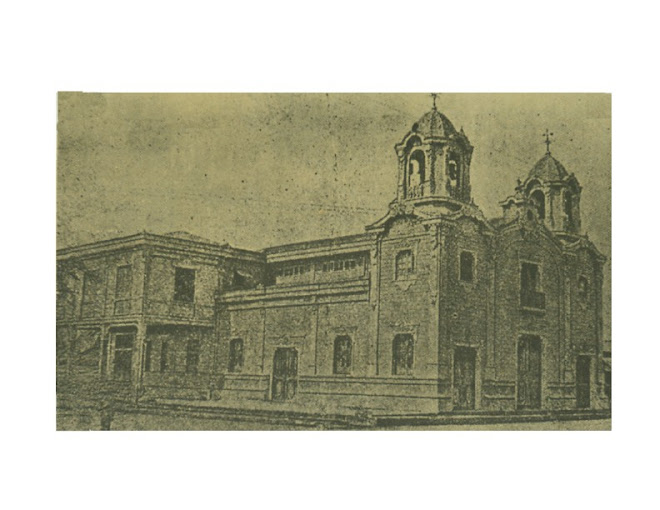THE BRIEF HISTORY OF THE
YOUTH OF IGLESIA FILIPINA INDEPENDIENTE
I answered. “ The God of Heaven will give us success. We are His servants, and we are going to start building. But you have no right to any property in Jerusalem, and you have no share in its traditions.” NEHEMIA 2:20
According to the account in the brief historical presentation to be found in the Comprehensive Program of the YIFI document, the first organized of the IFI to demonstrate its concern for the Youth began in the early 60’s with the establishment of a PIC-Episcopal Churches Student Center in Lerma Street, Sampaloc, Manila. IFI and PEC student Chaplains were assigned to run its programs. It then became a second home especially to those students who came from the provinces. Counseling services were provided to extend advises to the many problems students while in the Universities and Colleges. There were even visits conducted near by campuses and dormitories, as well as, sorties to various towns and cities to conduct rallies and conferences intended to make the students more conscious of the Christian responsibilities.
Prior to the establishment of the Joint PIC-PEC Student Work Program in Manila, an IFI Campus Ministry at the University of the Philippines in Diliman, Quezon City had already been in operation. By the early 1960’s, the UP Congregation was able to put up its own church at the periphery of the UP Katipunan Campus. After several years, they developed a flourishing student work, which gave birth to the formation of the UPPICSA or University of the Philippines - Philippine Independent Church Student Association. However, during this period there is no existing national youth formation representing the IFI youth. The focus of the young people then was very typical and confined within the limits of the Church and that of simply producing good boys and girls.
Caught in the vortex of political protest and unrest that time, and propelled by a commitment to nationalistic values and ideals, the UPPICSA with the approval of the late Obispo Maximo Isabelo delos Reyes, Jr. called a National Youth Assembly in Marikina, Rizal in 1969. In that historic gathering the Youth decided among other things to denounce the political and economic order (semi-feudal and semi-colonial) particularly the US- Marcos dictatorship, and the Church hierarchy’s lack of concern for Youth (i.e. participation in the decision making process), and the neglect of the Church in its social responsibility. It was the first organized move of the Youth to reclaim the nationalist heritage and tradition and spirit of the IFI.
To have a more powerful voice the delegates organized themselves into a movement called the Kabataang Pambansa Katedral (KPK) - the precursor of the National Youth Organization (NYO). The IFI youth at this point in time transcended to purely Church-based activities towards a higher degree of expression of faith and social involvement. They were swept alongside the rising tide of militant youth and student power that challenge the innate existing comforts of the Dictatorship of both local and foreign ruling classes. In 1972, the KPK held an assembly in UP Los Baños, Laguna, affirmed the need to oppose the three unholy trinity of imperialism, reasons why the majority of the Filipino people are suffering. Inside the Church, the KPK was instrumental in challenging the well-entrenched conservatism and reactionary tendencies of our Church leaders and the demanded reforms within the Church and the restoration of the genuine teachings of history of the IFI. The NYM was a part of the historic Second Propaganda Movement or the popularly known as the First Quarter Storm (FQS).
Upon the election of Obispo Maximo Macario V. Gaa in 1973, he pledged to give priority to the youth the Supreme Council of Bishops in its annual meeting in 1974 passed a resolution urging diocesan bishops and parish priests to develop youth programs in their areas. The SCCB also created the office of the National Youth Coordinator, appointing then Fr. Eustaquio D. Coronado (now Bishop of Laguna) to the position. From April 21-24, 1976 a National Youth Consultation was held at St. Andrew’s Seminary and the delegates expressed the need to restructure the National Youth Organization and adopt a National Constitution and by-laws for the organization. The preparatory committee was immediately organized. Later on, after adopting its Constitution and by-laws, the assembly gave birth to the National Cathedral Youth Organization (NCYO) of today originated, Mr. Fructuso Jun Sabug of Antique was elected Chairperson.
By the following year, the youth successfully campaigned for recognition for the youth sector to be more involved in the life of our church by enfranchising the youth sector in the Church organizational structure from all levels was realized in the ratification of the IFI Constitution and Canons of 1977.
It was only in 1981 at Kaliraya, Quezon, where the National Youth Organization came into being. As with the regards to the transition from the NFDYO to the NYO and the circumstances surrounding its changes and differences, establishment of the NYO came during this period.
The life of the NYO had its ups. downs and turn until it came to the point that it almost ceased to operate as an organization. It was in the year 1994 to 1996 that the Youth started to rebuild, it was also in that year in Sta. Cruz, Laguna, where the National Youth General Assembly, came up with a group of committed youth leaders gave their full-time for such difficult task.
In 1999, during the 11th National Youth Convention held in Gasan, Marinduque, with a theme that says, “KABATAANG AGLIPAYANO: Ipagpatuloy ang pagyakap sa dakilang pamana, pagbuklurin ang lakas, pag-ibayuhin ang pagkilos tungo sa panibagong siglo sa paglilingkod sa Diyos at Bayan.”, the youth had a comprehensive amendment in their Constitution and By-laws. It includes the approval of the new name for the organization, the YOUTH OF THE IGLESIA FILIPINA INDEPENDIENTE, a new logo and identity, new organizational structure, and a new set of leaders. Responding to the call of the mother church, and to help in the preparation for the IFI to face her 100th year of serving God through His people.
The 12th National Youth Convention was recently held on April 30-May 06 at Aglipay Central Theological Seminary (ACTS), Nancamaliran West, Urdaneta, Pangasinan where more than a hundred young people collectively gather in fellowship and re-affirmed the covenant to God by serving the people though the IFI. Deeply inspired by the life and deeds exemplified by Aglipay, Don Belong and several martyrs of this nationalist church, the new leadership of NYEC with resolved backing from the general convention, vowed for a “renewed vigor” in living-out her rich heritage, pursue her historical mission, ministry and struggle towards the establishment of Shalom, for God and country.
Notwithstanding the unprecedented difficulties of the youth, as church people who witness injustices in our society today, the YIFI during its 13th National Youth Convention held at Iglesia Filipina Independiente, Parish of La Purisima Concepcion, Balaoang Paniqui Tarlac, on April 30-May 4, 2005 are geared towards strengthening their response, the call to “Be like Christ, He came to serve and not to be served” (Matt. 20:28). Since its massive and intensified efforts of consolidation and raising its prophetic response beginning 1995, the YIFI is at the juncture of utilizing its capacities to a more active participation in the development of the local churches. As the youth determines its place in the local church, it continues to address challenges in its organizational consolidation thru systematic and massive education, and further develop its skills in addressing the urgent call of our church thru systematize educational processes and bring to the core of the people’s struggle the warm solidarity and committed service of the youth.
NATURE AND CHARACTERISTICS:
1. Christian - acknowledges that Jesus Christ is Lord and savior, the Holy Bible is an integral part of the Church’s ministry, it is necessary to be in fellowship with other Christian and secular youth organizations. To be faithful in promoting the Church’s heritage and well being of God’s people.
2. Nationalistic - to bear in mind and spirit the prophetic and historical ministry of the fore bearers of the IFI: to imbue the true meaning of nationalism, to uphold the interest and welfare of the Filipino people; and to have the passion for justice, peace, and integrity for God’s creations.
3. Progressive - not to be held captive by supervision, mysticism, religious fundamentalism and fanticism; to be identified with the nurturing and developing of potentials, skills and capacity of our Youth; to always be critical and remain with the conventional that hampers growth and maturity; and readying our Youth leaders to become respectable, committed and responsible servants of God and the people.
4. Movement - to deliver the finest of our ideals to help the Church and society in effecting changes (for the better) be a living force capable of organizing, educating and mobilizing our young people to uphold and struggle for their rights, interests and welfare to be a dynamic organization of young men and women who are critical, bold and daring in challenging anything and anyone that will do harm as a sector, the Filipino Church and the suffering.
THE OFFICIAL SEAL OF THE ORGANIZATION:
1. YOUTH - Recognized as the strong foundation of the organization, it should strengthen its solidarity, camaraderie and actively promote its total development its total development to serve God and Country.
2. Pro Deo et Patria - To acknowledge that God as our Divine Providence and we live to be faithful in promoting the Church heritage and serve our country for the glory of His name.
3. Iglesia Filipina Independiente - To bear in mind and spirit the historical ministry of our Church in the mission and service of being servants of our God and to our country as well.
4. Vine - The Youth should uphold and unite in the mission of Jesus Christ carry out His cross and follow His footsteps to be one of His people. Holy Bible is the Strong shield and arm of youth to protect and define their faith.
5. Bamboo Cross - A symbol of great love to our Savior.
6. Knotted Rope - The individual member has their duties and obligations to protect and develop this organization, their participation and unity symbolize strength, hope and power of the Church.
7. Color Red - It symbolizes the blood of Christ for our Salvation and the color of bravery as what the servants, martyrs, followers and heroes offer their lives to follow Jesus’ footsteps.
8. Color Blue - Symbolized the honesty, integrity and dignity as a part and member of these nationalist Church.
9. Philippine Map - Represent our country in which we are born and still need help and concern for the welfare of our mission and goals.
Wednesday, May 6, 2009
Subscribe to:
Post Comments (Atom)





No comments:
Post a Comment